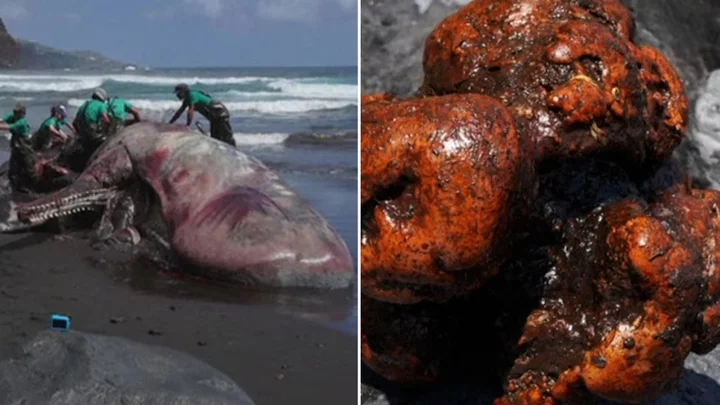Scientists have discovered a huge amount of hidden treasure inside a gigantic whale carcass that washed up on a beach of the Canary Island of La Palma.
A sperm whale was found to have a staggering £425,000 worth of 'floating gold' in it's stomach which an expert believes contributed to the creature's death.
Antonio Fernández Rodríguez, the head of the institute of animal health and food security at the University of Las Palmas, studied the corpse and although local authorities were stumped by the whale's death, he put it down to one thing: ambergris.
After studying the animal's colon, Rodriguez said that he managed to find a hard. object stuck in its intestine which he managed to cut out.
Sign up to our free Indy100 weekly newsletter
Rodriguez said: "What I took out was a stone about 50-60cm in diameter weighing 9.5kg. When I dissected and removed the stone I turned around and everyone on the beach looked at me in surprise, but for me at that moment I understood where the origin of the infection was coming from.
"The waves were washing over the whale. Everyone was watching when I returned to the beach but they didn’t know that what I had in my hands was ambergris."
However, ambergris isn't like the stereotypical type of gold or treasure that you would usually associate with the sea, or even pirates for that matter.
Ambergris, is a prize possession of perfumers around the globe, hence its value, and is made up of undigested squid and cuttlefish that the whale has vomited.
Even though it sounds disgusting, the extremely rare substance is actually said to smell of wood, and this particular piece of ambergris was reportedly worth €500,000 (£425,000).
The university are now hoping to find a buyer for the item with fund set to go towards the victims of the 2021 La Palma volcano eruption.
Rodriguez adds: "The law is different in every country. In our case, I hope the money will go to the island of La Palma, where the whale ran aground and died."
Have your say in our news democracy. Click the upvote icon at the top of the page to help raise this article through the indy100 rankings.

